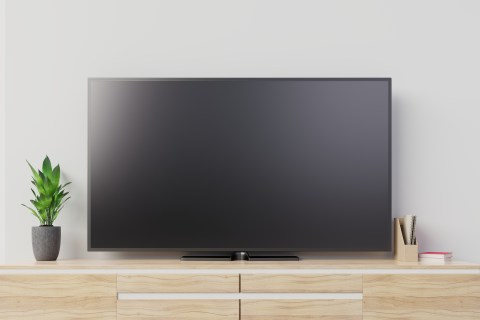TVs have become a staple in almost every household, providing us with entertainment, news, and a way to unwind after a long day. But have you ever wondered if it’s safe to leave your TV on all the time? In this article, we will explore the potential risks and benefits of keeping your TV on continuously.
Let’s start with the issue of burn-in. Burn-in occurs when a static image is displayed on the screen for an extended period, resulting in a permanent ghost image. While this was a common problem with older CRT TVs, modern LCD and LED TVs are less susceptible to burn-in. However, it’s still a good idea to avoid leaving static images on the screen for too long, just to be on the safe side.
Another concern when it comes to leaving your TV on is energy consumption. TVs, especially older models, can consume a significant amount of electricity. Even when in standby mode, your TV is still using energy. To minimize energy usage, consider switching off your TV completely when not in use. Additionally, reducing the brightness of your TV can also help lower energy consumption without sacrificing picture quality.
Now, let’s talk about the impact of leaving your TV on while you sleep. Many people enjoy falling asleep to the soothing sound or soft glow of their TV. However, research suggests that sleeping with the TV on can have negative effects on your sleep quality. The constant stimulation from the screen can disrupt your body’s natural melatonin production, ultimately leading to a decrease in the amount and quality of sleep you get. Moreover, long-term exposure to artificial light at night has been linked to various health issues, including obesity, diabetes, and even cancer.
If you still prefer to sleep with your TV on, there are a few ways to minimize the potential negative effects. Firstly, consider setting a sleep timer on your TV to automatically turn it off after a certain period. This way, you can enjoy a bit of TV time before sleep without the screen staying on all night. Additionally, try to keep the TV at a distance from your bed and dim the brightness as much as possible to reduce the impact of the light on your sleep.
It is generally recommended to switch off your TV completely when not in use to minimize energy consumption and potential risks like burn-in. Sleeping with the TV on can negatively impact your sleep quality and overall health, so it’s best to find alternative ways to relax before bedtime. Ultimately, the decision is yours to make, but being aware of the potential consequences can help you make an informed choice.

Is It OK to Leave TV On 24 7?
Leaving your TV on 24/7 is generally not recommended for several reasons:
1. Energy Consumption: TVs consume a significant amount of electricity, even when they are in standby mode. Leaving your TV on all the time can result in higher energy bills and unnecessary energy waste.
2. Lifespan: Continuous usage of your TV can shorten its lifespan. The components inside the TV, such as the backlight, can wear out faster when constantly in use. This may lead to a decrease in picture quality or even complete failure of the TV over time.
3. Burn-in: Burn-in occurs when a static image is displayed on the screen for an extended period, causing permanent damage to the display. While modern TVs have improved technology to reduce the risk of burn-in, it is still advisable to avoid leaving static images on the screen for long periods, especially on older models.
4. Overheating: Running your TV continuously can cause it to overheat, which may affect its performance and potentially lead to damage. Proper ventilation and periodic rest for the TV are necessary to prevent overheating issues.
5. Fire Hazard: Although rare, leaving your TV on for an extended period increases the risk of fire. Faulty wiring or electronic components can potentially lead to electrical fires if left unattended.
It is not recommended to leave your TV on 24/7 due to the potential negative impacts on energy consumption, lifespan, burn-in, overheating, and fire hazards. It is advisable to turn off your TV when not in use to save energy, extend its lifespan, and ensure its safe operation.
Is It Better to Leave Your TV On or Turn It Off?
When it comes to the energy consumption of your TV, it is more efficient to turn it off completely rather than leaving it on standby mode. While standby mode uses less energy compared to full power, it still consumes a significant amount of electricity over time. Therefore, it is recommended to switch off your TV completely when you are not using it.
Here are a few reasons why it is better to turn off your TV:
1. Energy consumption: Leaving your TV on standby mode still draws power, albeit at a lower level. This standby power, also known as phantom or vampire power, can account for a significant portion of your home’s energy consumption. By turning off your TV completely, you can reduce this unnecessary energy usage.
2. Cost savings: When you turn off your TV, you not only conserve energy but also save money on your electricity bills. Over time, the cumulative savings can be substantial, especially if you have multiple TVs in your household.
3. Environmental impact: By reducing your TV’s energy consumption, you contribute to a smaller carbon footprint. The electricity used by electronic devices, including TVs, often comes from non-renewable sources such as coal or natural gas. Minimizing energy waste helps mitigate the environmental impact associated with these energy sources.
In addition to turning off your TV, you can further optimize its energy efficiency by adjusting the brightness settings. Most TVs are set to factory default brightness levels, which are often brighter than necessary for typical home viewing conditions. Lowering the brightness can help reduce energy consumption without sacrificing the quality of your viewing experience.
Is It OK to Leave a TV On All Night?
Leaving a TV on all night is generally not recommended by experts due to several negative effects it can have on your sleep and long-term health. Here are some reasons why leaving a TV on all night is not ideal:
1. Reduced sleep quality: Having a TV on while you sleep can interfere with the quantity and quality of your sleep. The noise and light emitted from the TV can cause disturbances and prevent you from entering deeper stages of sleep, leading to a less restful night.
2. Disruption of melatonin production: Melatonin is a hormone that regulates your sleep-wake cycle. The blue light emitted by TVs can suppress melatonin production, making it harder for you to fall asleep and stay asleep throughout the night.
3. Overstimulation of the brain: TVs are designed to capture our attention with fast-paced visuals and engaging content. When you sleep with the TV on, your brain may remain in a state of overstimulation, making it harder for you to relax and unwind.
4. Negative impact on sleep patterns: Regularly sleeping with the TV on can disrupt your natural sleep patterns and contribute to sleep disorders such as insomnia. Your body may become accustomed to relying on the TV for sleep, making it difficult to fall asleep without it.
5. Long-term health effects: Chronic exposure to artificial light at night, including that from a TV, has been linked to various health problems. These include an increased risk of obesity, diabetes, heart disease, and certain types of cancer.
While it may be tempting to fall asleep with the TV on, it’s generally best to create a sleep-friendly environment that promotes quality rest.
Does Leaving the TV On All Day Use a Lot of Electricity?
Leaving the TV on all day can indeed consume a significant amount of electricity. On average, modern TVs use around 58.6 watts when they are actively being used or turned on. This means that if you leave your TV on for 24 hours straight, it would consume approximately 1.4 kilowatt-hours (kWh) of electricity.
To put this in perspective, let’s compare it to other household appliances. A refrigerator typically uses around 120 watts, a washing machine uses approximately 500 watts, and a clothes dryer uses around 3,000 watts. So, even though a TV may not consume as much electricity as these larger appliances, it is still considered one of the higher energy-consuming devices in a typical household.
Furthermore, it’s important to note that TVs also consume electricity when they are in standby mode, waiting to be turned on. On average, they use around 1.3 watts in standby mode. While this may seem like a small amount, it can add up over time, especially if you have multiple TVs in your home.
To minimize electricity consumption, it is advisable to turn off your TV when you are not actively using it. This can help reduce both your energy usage and your electricity bills. Additionally, using features like power-saving modes and timers can further optimize energy efficiency.
Leaving your TV on all day can use a significant amount of electricity. While it may not consume as much energy as larger appliances like refrigerators or dryers, its energy usage is still higher than average. It is advisable to turn off your TV when not in use to minimize energy consumption and reduce electricity costs.
Conclusion
TVs are essential electronic devices in most households, providing entertainment and information. While they may consume more energy than other appliances, there are ways to minimize their impact. Adjusting the brightness settings and switching to standby mode when not in use can help reduce energy consumption. It is important to avoid leaving still images on the screen for extended periods to prevent burn-in. Additionally, sleeping with the TV on can have negative effects on sleep quality and overall health, so it is advisable to find alternatives or mitigate the potential harm. being mindful of energy usage and implementing best practices can help maximize the enjoyment of TVs while minimizing their environmental impact.













